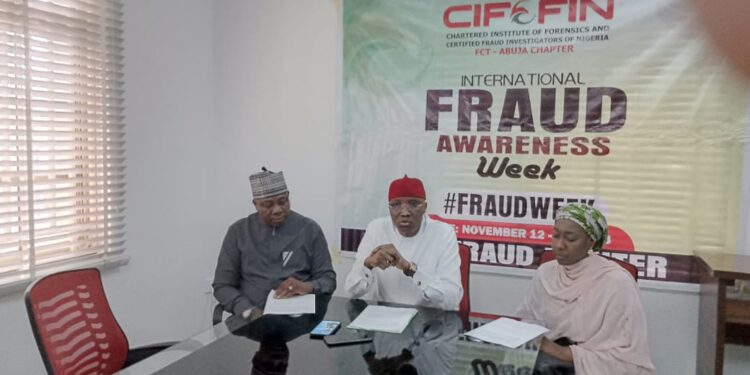By Abubakar Yusuf
The pioneer President and Chairman, Governing Council , Chartered Institute of Forensics and Certified Fraud Investigators of Nigeria CIFCFIN, Dr Ilyasu Gashinbaki has asked the Nigeria government to move beyond the Pitfalls of P& ID after the recovery of it’s funds from the contract scam.
Gashinbaki made this assertion on Thursday during a maiden world press conference titled “P&ID Contract Scam; Avoiding Pitfalls By The Federal and Sub- National Governments, Through Forensic Audit and Digitisation of Contract Management Process in Government” held at Asokoro, Abuja.
He said the $11 billion damages earlier awarded in favour of Process and Industrial Development (P&ID ), would have had a collosal toll on the country, if not upturned by the higher court.
The President criticized the current practice of contract vetting , as it merely scratches the surface, with a focus clause by clause reading and legal interpretation, stating the need to go beyond surface by adopting the forensic approach, that vets the contract beyond the clauses.
The Chairman stated that the debut of forensic as the much needed light for this ugly development, with the combination of legal skills, investigation and digital automation to analyse and vet all contracts prior to their execution.
He reminded Nigerians on the efficacy of contract forensics which delve deep into contractual implications, investigation of parties, highlighting the importance in the wider context of an organisational goals.
The President recalled what led to the P&ID saga was a fall out of a contract to build and operate an Accelerated Gas Development Project located in Adiabo, Odukpani Local Government Area of Cross River State, were Nigerian government was to source for a natural gas from oil mining leases(OMLs), 123 and 67 operated by Addax Petroleum and Supply to P&ID to refine into fuel suitable for power generation in the country.
He said P&ID was able to defraud Nigerian government owing to the absence of forensic investigation for a job not executed, with a claim of profit spread for 20 years through litigation.
Gashinbaki who advised that partnerships with the institute will specifically nip in the bud the incidence of P&ID , government officials, government lawyers, private sector players, professionals that gang raped to defraud the federal government and at subnational levels.
He expressed worries on the vulnerability of government both at Federal and Sub- National levels, as loss from contract scam, procurement fraud, fraudulent court judgements, stood at 1.4trillion and may rise to 3trillion with no concerted efforts on the part of governments in 2025.
The Chairman governing council of the institute however stressed the need to make concerted efforts towards ameliorating and eliminating the current and future losses, through partnerships with the institute to conduct a comprehensive forensic audits of all government contracts, court judgements at the Appeal Court level before proceeding to the Supreme Court.
The institute was also prepared to assist government at the national and sub national levels, to introduce end to end digitization of the contract management process in government using the diplomate of Digital Forensic of the institute.
It has also carried out an extensive deliberation with the National Assembly to key into their investigations of the activities of Ministries, Departments and Agencies MDA’s using the forensic templates rather than analogue procedure without recourse to their oversight functions.
He advocated that with forensic examination in place by the institute, the wastages been witnessed could be channeled to funding social and economic policies of government, like Education, Health among many others.











